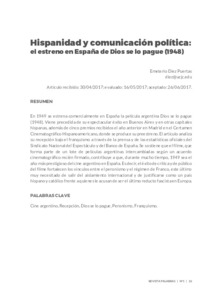Por favor, use este identificador para citar o enlazar este ítem:
https://repositorio.uca.edu.ar/handle/123456789/7473| Título: | Hispanidad y comunicación política : el estreno en España de Dios se lo pague (1948) Hispanidad and political communication : the premiere in Spain of God Bless You (1948) |
Autor: | Diez Puertas, Emeterio | Palabras clave: | CINE ARGENTINO; COMUNICACION POLITICA; PERIODISMO; DISCURSO PERIODISTICO; PERONISMO; FRANQUISMO | Fecha de publicación: | 2017 | Editorial: | Universidad Católica Argentina. Facultad de Ciencias Sociales. Departamento de Ciencias de la Comunicación y Periodismo | Cita: | Diez Puertas, E. (2017). Hispanidad y comunicación política : el estreno en España de Dios se lo pague (1948) [en línea]. Palabras : Estudios sobre Periodismo y Comunicación, 1(1). Disponible en: https://repositorio.uca.edu.ar/handle/123456789/7473 | Resumen: | Resumen: En 1949 se estrena comercialmente en España la película argentina Dios se lo pague (1948). Viene precedida de su espectacular éxito en Buenos Aires y en otras capitales hispanas, además de cinco premios recibidos el año anterior en Madrid en el Certamen Cinematográfico Hispanoamericano, donde se produce su preestreno. El artículo analiza su recepción bajo el franquismo a través de la prensa y de las estadísticas oficiales del Sindicato Nacional del Espectáculo y del Banco de España. Se sostiene que el filme, que forma parte de un lote de películas argentinas intercambiadas según un acuerdo cinematográfico recién firmado, contribuye a que, durante mucho tiempo, 1949 sea el año más prestigioso del cine argentino en España. Es decir, el éxito de crítica y de público del filme fortalecen los vínculos entre el peronismo y el régimen de Franco, este último muy necesitado de salir del aislamiento internacional y de justificarse como un país hispano y católico frente a quienes le acusan de ser el último reducto fascista en Europa. Abstract: The Argentine film God Bless You (1948) is commercially released in Spain in 1949. It is preceded by its spectacular success in Buenos Aires as well as in other Hispanic capital cities in addition to the five awards received the previous year in Madrid in the Hispano-American Film Festival, when the film was previewed. The article analyses its reception under the Franco regime through the press and official statistics from the National Union of Entertainment and the Bank of Spain. It is argued that the film, which belongs to a batch of Argentine films exchanged according to a recently signed film agreement, contributes to the long-lasting perception of 1949 as the most prestigious year of Argentine cinema in Spain. That is to say, achieving great success both with the critics and the public strengthens ties between Peronism and the Franco regime; the latter very needed to come out of the international isolation and to be justified as a Hispanic and Catholic country facing those who accuse Spain of being the last fascist redoubt in Europe. |
URI: | https://repositorio.uca.edu.ar/handle/123456789/7473 | ISSN: | 2591-510X | Disciplina: | PERIODISMO | Derechos: | Acceso Abierto | Fuente: | Palabras. Estudios sobre Periodismo y Comunicación Año 1, Nº 1, 2017 ISSN 2591-510X |
| Aparece en las colecciones: | PAL 2017 Año 1 nro. 1 |
Ficheros en este ítem:
| Fichero | Descripción | Tamaño | Formato | |
|---|---|---|---|---|
| 947-3144-1-PB.pdf | 1,63 MB | Adobe PDF |  Visualizar/Abrir |
Visualizaciones de página(s)
131
comprobado en 30-abr-2024
Descarga(s)
138
comprobado en 30-abr-2024
Google ScholarTM
Ver en Google Scholar
Este ítem está sujeto a una Licencia Creative Commons

